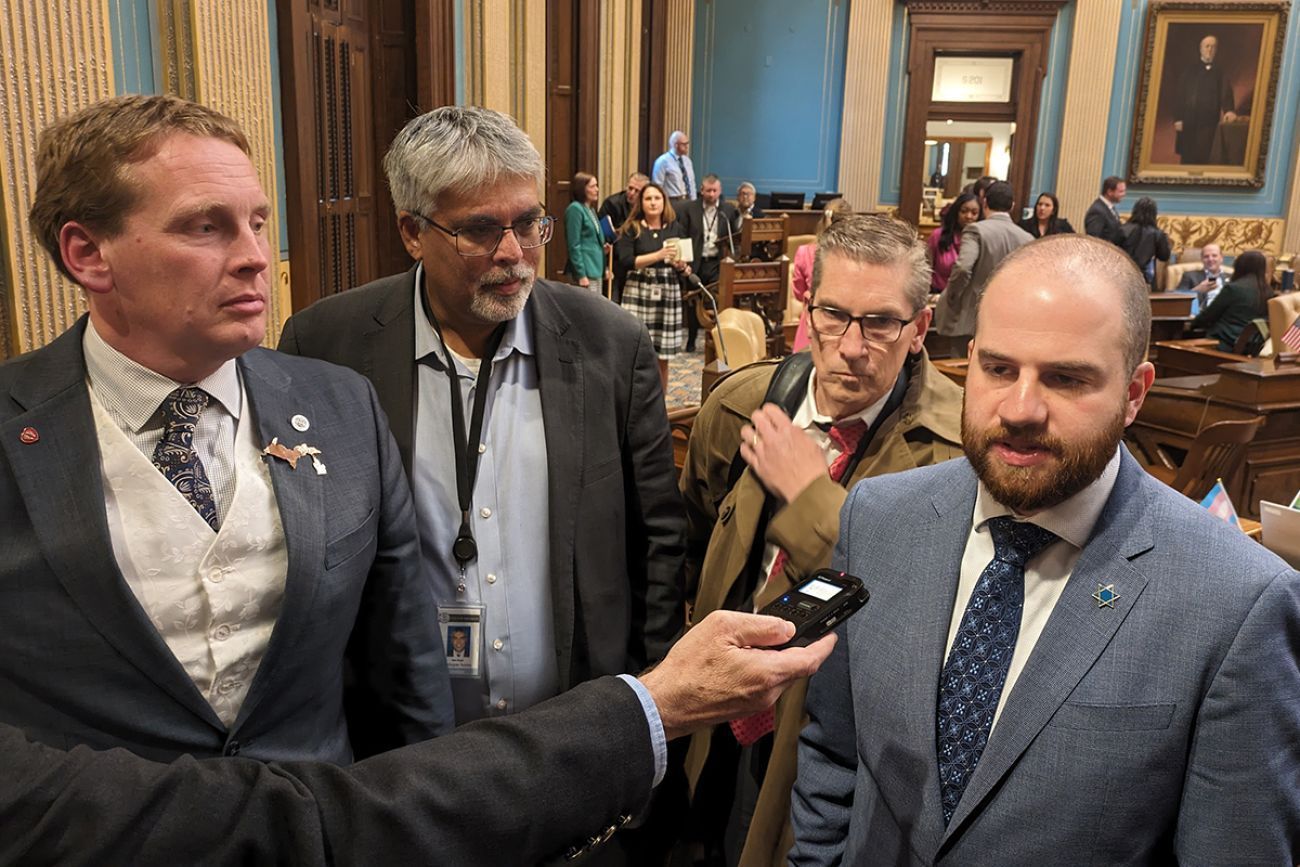New momentum for transparency plan in Michigan Senate

- Michigan Senate to begin hearings on bills that would expand the Freedom of Information Act
- Michigan is one of only two states that fully exempts the governor and lawmakers from public records requests
- The state Senate has historically been a roadblock to similar transparency legislation. Now, all eyes are on Gov. Gretchen Whitmer
LANSING — A long-stalled transparency push to expand public access to government records appears poised to clear at least one major hurdle this year in the Michigan Senate.
Bipartisan bills introduced by Sens. Jeremy Moss, D-Southfield, and Ed McBroom, R-Vulcan, would for the first time subject the Legislature and governor's office to the state's Freedom of Information Act.
Michigan's 1976 FOIA law, like others across the country, has for decades required local government officials and taxpayer-funded state departments to produce internal records upon request.
But Michigan is one of only two states that fully exempts the governor's office and lawmakers from its FOIA law, contributing to its failing grade in a 2015 report card that scored transparency and ethics laws across the country.
Related:
- Michigan House passes transparency plan fourth time. Will Senate finally act?
- Michigan Gov. Whitmer pledged transparency. Now she defends secret deals.
- Michigan lawmakers OK financial disclosure rules; critics say they fall short
The Senate Oversight Committee is expected to take up the legislation in early February, Chair Sam Singh, D-East Lansing, told Bridge Michigan. And Moss said he hopes the full Senate will pass the plan by "Sunshine Week," an annual transparency advocacy week set for March 10-16.
Similar bills have passed the state House in several prior sessions before stalling in the upper chamber amid opposition from past Republican leadership. But Senate Majority Leader Winnie Brinks, a Grand Rapids Democrat starting her second year in the post, is backing the new push.
"The contrast between a couple senate majority leaders who were not just absent in this process but harmful in this process, and now a senate majority leader who tasked me with moving this forward as a priority, couldn't be more different," Moss told Bridge.
The Senate has not been the only obstacle to prior legislation: Democratic Gov. Gretchen Whitmer also raised concerns because earlier versions of the bills would have created different rules for her office and the Legislature.
The new bills, as revised by Moss and McBroom and introduced in November, propose a new approach that aims to win over Whitmer, who has not honored her 2018 campaign promise to voluntarily open her office to records requests.
The legislation would put include both the governor and lawmakers under the Freedom of Information Act rather than creating a separate law for the Legislature. The previously proposed Legislative Open Records Act would have created a unique appeals process for denied requests outside the court system.
Whitmer hasn't weighed in on the new bills, but she said last fall she would be ready to sign a public records request expansion law that treated her office and the Legislature equally.
"This gets us closer to where we need to get for her signature," Moss told Bridge.
The bills, as introduced, propose several unique exemptions for the governor's office, which would not be required to disclose records related to executive office security, internal investigations, prisoner commutation decisions, initial budget recommendations and pending appointment or firing decisions.
Neither the governor nor lawmakers would be required to disclose communications with constituents, unless those constituents were registered lobbyists.
The proposed exemptions are similar to versions previously passed by the House. Moss said he does not anticipate adding many more.
“I haven't heard a lot of people tell me, ‘Hey, I need to hide this, or I need to hide that,’” Moss said. “Behind the scenes, it's more an education campaign about how this is going to work, rather than fielding a lot of complaints.”
House Speaker Joe Tate, D-Detroit, has said he is open to expanding the state's public records law, and lawmakers on both sides of the aisle told Bridge they think the new Senate bills could win bipartisan support in the lower chamber, where Democrats will be without a voting majority until at least April.
"It would have bipartisan support if it was real," said Rep. Andrew Beeler, R-Port Huron, who criticized personal disclosure legislation that Whiter signed into law late last year despite concerns over loopholes. "You don't want to pass another milquetoast ethics package that doesn't really do the job.”
State Rep. Tom Kunse of Clare, the Republican vice chair of the House Ethics and Oversight Committee, told Bridge he agreed with the “intent” of the new bills, as introduced in the Senate.
Kunse urged Democratic leaders to take up other long-discussed ethics and transparency reforms this year, including a “cooling off period” that would prevent lawmakers from immediately taking new jobs as paid lobbyists.
“FOIA is a great start,” Kunse said. “I want progress, not perfection, and I think this is a step in the right direction.”
See what new members are saying about why they donated to Bridge Michigan:
- “In order for this information to be accurate and unbiased it must be underwritten by its readers, not by special interests.” - Larry S.
- “Not many other media sources report on the topics Bridge does.” - Susan B.
- “Your journalism is outstanding and rare these days.” - Mark S.
If you want to ensure the future of nonpartisan, nonprofit Michigan journalism, please become a member today. You, too, will be asked why you donated and maybe we'll feature your quote next time!




